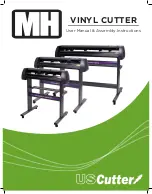
F-550
We do not recommend using the maximum cutting width (
) given by the main deck cover. The operator is unable to lead the
machine sufficiently straight and precisely to remove the vegetation along the full deck width. We recommend that the operator drives the
machine partialy (approx. 5-10 cm from the edge of the main deck) in the cut vegetation (illustrated on
Pic. 5
perspective).
Following this principle will avoid any missed strips on the area maintained.
2.4.3.2 Changing the cutting height
Always turn off the engine and wait until the work tool stops, before engaging in any activity near the machine!
Always turn the engine off before leaving the machine!
The spur is factory set to the maximum cutting height for use in even the toughest terrain. If you are removing lighter, lower vegetation
or perhaps completely dry vegetation, you can decrease the cutting height to 4 cm. This will achieve better grinding of removed vegetation.
Changing the height is easily done after removing the
pin with spring
1
by rearranging a discrete number of
washers
2
(see
Pic. 8
).
Rearranging the washers provides you with up to 16 various cutting height positions.
2.4.3.3 Method of vegetation cutting
The vegetation must first be cleared of solid objects (such as rocks, wires, free construction remnants, etc.),
which could be ejected or which could damage the machine. If they cannot be removed, avoid these areas.
The machine has high land penetration. Firmly grip the handlebars to maintain a straight direction. Use increased
caution when walking behind the machine.
When cutting on slopes, proceed along contours for best result. In very steep slopes, such as e.g. ditches, always
drive perpendicular to the slope.
Observe that you maintain a safe climbing angle, see
Set the engine throttle to maximum rpm, let the work tool rotate to maximum rpm and then drive against the vegetation that you wish to
remove. The vegetation is ground up by the work tool under the main deck and the ground vegetation is directed by the specially shaped
cover to the space between the wheels, where it is removed to the rear of the machine.
If the cut vegetation is very thick, grown in, rotted, or flattened, the machine cutting width must be proportionally decreased to prevent a
large reduction of work tool rpms, which would consequently decrease the cutting quality.
We recommend that you handle the removed vegetation such that the uncut vegetation remains to the left of the
machine. The vegetation is processed more efficiently. The opposite procedure is also fine.
Thick and high vegetation raises the machine; do not try to keep the front spur always on the ground. You may instead
aid the machine by lifting and cutting only the upper part of the vegetation while turning the wheel drive off. Afterwards
return to this area and cut it with the spur on the ground.
2.4.3.4 Problems during cutting
Be especially careful when tilting the machine up or when moving backward with the machine!
The machine must only be tilted to the rear on the handlebars. Always exercise increased caution when you are
moving in the area of a raised machine! Ensure that it cannot be set in motion when unattended!
The engine must always be turned off when cleaning the deck operating space!
Use increased caution when cleaning the area below the upper cover. The blades are sharp. Use work gloves to
protect your hands during cleaning or use an appropriate object, e.g. piece of branch.
Always wait for the work tool to stop before performing any activity on the machine or its vicinity.
1) The engine loses rpm, but does not stall.
Immediately turn off the machine wheel drive and gently lift the front of the machine (by pressing downwards on the
handlebars) while slightly moving backwards. The operating space shall clean itself of excessive debris. Afterwards,
drive over the vegetation once more.
2) The work tool has stopped, the motor has stalled.
Release both control levers on the handlebars and lift the front end of the machine. Move the machine slightly
backwards. Clean out the space below the upper cover and scatter the grass debris around the immediate area. Start
the engine, engage the work tool drive and drive again against the brush.
3) The removed vegetation sticks to the side of the deck cover (probably due to thick and grown in vegetation).
Try to change the direction of cutting or lift the front end to remove the top part of the vegetation. Drive afterwards
again towards the vegetation.
25
05
/2
01
2














































